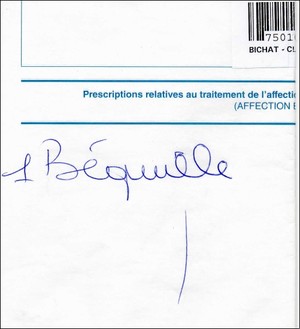Part 2: French Hospital Lessons

- SUBSCRIBE
- ALREADY SUBSCRIBED?
BECOME A BONJOUR PARIS MEMBER
Gain full access to our collection of over 5,000 articles and bring the City of Light into your life. Just 60 USD per year.
Find out why you should become a member here.
Sign in
Fill in your credentials below.
 I entered Hôpital Bichat on February 4, 2011 and ended up spending nine weeks for tests that, in the end, revealed I had cancer. I also had to have a hip replacement operation on March 8 because the cancer had metastasized onto my bones. In fact, the reason I was admitted to the hospital in the first place was that there were holes in my hipbone.
I entered Hôpital Bichat on February 4, 2011 and ended up spending nine weeks for tests that, in the end, revealed I had cancer. I also had to have a hip replacement operation on March 8 because the cancer had metastasized onto my bones. In fact, the reason I was admitted to the hospital in the first place was that there were holes in my hipbone.
French hospital personnel are now really stressed because of budget cuts, but the quality of care is still very high. And if you asked me how much it cost, I couldn’t tell you. I never saw a bill. Everything was billed directly to my standard health insurance company and to my complementary insurance (my mutuelle). Not bad, huh?
I’d like to share four lessons on how to survive a hospital experience in France:
1. Make sure you have a network of friends. The quantity is not as important at the quality of the friendship. As I mentioned, this really helped me “set up” my stay at Bichat, even though I was hospitalized with no forewarning whatsoever. This also helps when your toothbrush falls into the toilet. Oops! Fortunately, just then I had a friend scheduled to visit me who was happy to buy a replacement toothbrush and boy was I happy too! It was the best toothbrush I ever had. Certainly, much better than my misadventures one.
2. Join associations/groups that express your interest. I’ve got a wonderful network of friends, but they’ve got their own lives to live and I needed more. What saved me was my involvement in my synagogue. I had people visiting me almost every day! It was really a great support emotionally, as I never felt isolated or alone.
3. Relationships in France can change. The two ladies who cleaned my room seemed to really dislike me at first – perhaps because I was American? Who knows. But I persisted in being really polite with them and by the time I left, they were really nice to me too. Remember that when a French person doesn’t know you, they can be brusque and not especially nice. But as they get to know you, this often changes and suddenly they become wonderfully nice. It happens.
4. Use the French medical system, which is fairly open, as a backup if your doctor is a “jerk.” The young doctor who was in charge of my case was definitely in this category. I noticed that the “older” doctors were wonderful, empathetic, knowledgeable, and they listened to you! The young doctors, called internes, are often the complete opposite. I guess with their lack of experience, they feel that have to strictly go by the “rules and regulations.” And nothing else.
After my hip replacement, I needed to get two crutches (béquilles). I had brought one crutch to the hospital (from years ago when I had broken a toe), but it was really necessary to buy two new ones so they would be identical. The interne refused to give me a prescription for two crutches – only one. But think about it who was paying for the crutches? Not the hospital. Nope my health insurance would cover it, so what difference did it make? Solution: I saw a different doctor who gave me the prescription I needed!
Then I had to surmount another problem. You would think that I would be able to get the crutches in the hospital, given that I was not allowed to go out and about, and I had no family members in Paris to help me. But there were no crutches available there. So, how was I to get them? Answer: A member of my synagogue came to the hospital, got the (good) prescription and went out to get the crutches for me. Voilà
More in French medical care


